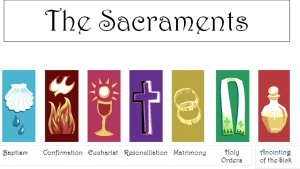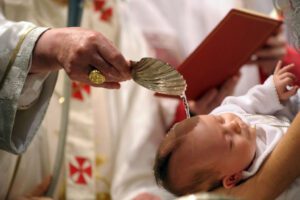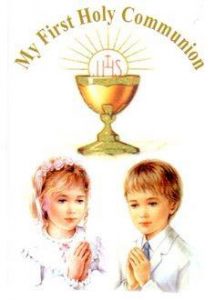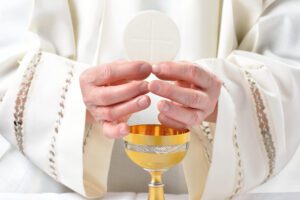If all languages A to Z do not appear on your screen use Tab to select, then hit Enter
Click on any item to select hidden text

- Baptism
- Reconcilliation – Confession
- Eucharist – Holy Communion
- Confirmation
- Holy Orders
- Marriage
- Sacrament of the Sick
The Seven Sacraments are explored in Alive-0 8 Term 1 Lesson 12.There are three sacraments of initiation:
– Baptism, First Eucharist and Confirmation
There are two sacraments of healing:
– Penance/Reconciliation and the Annointing of the Sick
There are two sacraments of vocation:
– Holy Orders and Matrimony.

How to Book a Baptism:-
A minimum of four weeks notice is required.
Bookings can be made by calling in person to the priest of the parish (we can’t accept bookings by telephone).
Baptisms take place at a time to suit families and in agreement with the parish priest.
The Baptism Team help Parents and God Parents to prepare for Baptism.
Sometimes we do things that hurt others or we fail to do things that might truly help others. Thus, we become disconnected from friendship and love with God, ourselves and others. We forget the message that Jesus gave us: ‘Love the Lord your God with all your heart, with all your mind, with all your strength, and love your neighbour as yourself.’ When we choose to reconnect with God’s friendship and love, we know that God our Father is ready to forgive us when we say sorry. The Risen Jesus brings us back to God’s friendship and helps us to be reconciled with God and others. ‘Each of the faithful is bound by an obligation faithfully to confess serious sins at least once a year.’
(Reference: Alive-0 3 and Alive-0 8)
(First Confession, First Holy Communion, Confirmation)
Grow In Love Religious Education for Primary School Children
The Christian Tradition teaches us that God is the source of all love.
The first Letter of St John states this very clearly:
‘God is love’ (1 Jh 4:8).
Therefore, where there is love, there is God.
Children experience the love of God through the love of their parents, families and others. Throughout this series we will help the children to come to a deeper understanding of the reality of God’s love in their lives: to know that God loves them unconditionally, that there is neither beginning nor end to the love of God, and that human love is only a hint of what God’s love is like.
In essence, preparing children for sacraments is a holistic process that involves the entire faith community – home, school, and parish – working together to nurture the child’s relationship with God and to help them understand and live out their faith.

Our Father who is in heaven,
and also in our school,
help us each day,
in our work and in our play
and our love will come shining through.
Amen.
Grow in Love Programme
Your children take part in the Grow in Love programme in school.
This excellent programme helps them prepare to meet Jesus in the Sacrament of Reconciliation (First Confession) and to receive Jesus in the Sacrament of the Eucharist (First Holy Communion).
The Grow in Love series aims to help children to see how they can respond to God’s love through love: by doing acts of love that mirror the actions of Jesus. They can show respect for God, for themselves, for one another and for all creation. We teach the children that, through the grace of God’s Spirit which we receive in Baptism, we are enabled to become witnesses to the love of God in the world by living as disciples of Jesus Christ.
Each week, parents and families will be asked to help their children to do something related to the programme at home. For this reason, the Grow in Love Children’s Book will feature illustrations, stories, poems and activities for families to do together.
Parents and children will also be invited to talk and pray about what is being learned in school.
To support your child the Grow in Love Programme is available online https://www.growinlove.ie/en/
First Confession – First Holy Communion
First Confession and First Holy Communion are big events for your child and for your family. It’s important that we prepare well for them.
Parish Preparation Programme
The Parish supports your child’s preparation in a number of ways through:
1. Classroom resources in advance of the preparation Mass
2. Classroom visits
3. Practice and rehearsals for the Sacraments
4. You may find these resources to be helpful:
* Overview of the Sacraments https://www.youtube.com/watch?v=vEq1agdIPXo
* The Sacrament of Reconcilliation https://www.youtube.com/watch?v=gEPGwKaaArA
Parental / Guardian Participation
Your participation is vital. Your children look up to you and listen to what you say. If you show them that preparing for these Sacraments is important, then they will follow your lead and example. First Confession and First Holy Communion are very positive and life-giving events for your child, your family, the school and the parish.
We strongly encourage you to:
1. Attend any parish meetings/programmes.
2. Pray with your child at home – you can use the booklet ‘Praying with your Child’ above.
3. Help them understand the significance of the Sacraments as moments whereby we meet Jesus. (The Short Guide booklet will help with this).
4. Help them see that their First Holy Communion day is about more than the just about what they wear or what they do after Mass. It’s part of a bigger story – the story of our faith.
Following their First Holy Communion children need to be encouraged to accompany their parents to Mass on a regular basis to enable them to make a genuine commitment to their faith.
If you have any questions or if you feel we can be of help to you, please do not hesitate to make contact with us. You can phone or email us on:
Fr. Tom Healy P.P. – parish of Mostrim (Edgeworthstown)
043 – 6671046 edgeworthstownparish@gmail.com
Fr. Pierre Pepper P.P. – parishes of Rathowen and Streete
087 – 6960542 mcdcoath@gmail.com
Preparing for Confirmation
1. Pray Daily to the Holy Spirit
Most likely, you address most of your prayers to God or Jesus. During this time of preparing for your Confirmation, begin incorporating the Holy Spirit into your day. It can be as simple as waking up in the morning and saying, “Come, Holy Spirit.” Or, you can find a prayer like this one to recite daily:
Come, Holy Spirit, fill the hearts of your faithful. And kindle in them the fire of your love. Send forth your Spirit and they shall be created. And you will renew the face of the earth. Lord, by the light of the Holy Spirit you have taught the hearts of your faithful. In the same Spirit help us to relish what is right and always rejoice in your consolation. We ask this through Christ our Lord. Amen.
2. Choose Your Sponsor Wisely
Choosing someone “cool” to be your sponsor can be tempting, but in this situation, you should look for someone who is more than just fun to hang out with. Choose a person you see living out his or her faith and attending Mass regularly. Make sure it is someone you would be comfortable asking questions about the faith or getting advice from about life situations.
3. Find a Saint You Connect With
Again, don’t just go with the popular Saints that everyone else chooses or a Saint with a cool-sounding name. Take time to pray about this (“Lord, lead me to a Saint”) and study some of the lives of the Saints. Find one who has a story you can relate to.
4. Make Your Service Hours Meaningful
Most of the time, service is part of the requirement to make your Confirmation, but even if it is not required by your Parish, find time to do something on your own. Don’t just hurry through this commitment or find easy ways to earn hours. Invest time in a service project that will help you grow in the Lord.
5. Go to Confession
If it is not offered through your Confirmation program, make sure that you go to Confession before the day of your Confirmation. To receive the fullness of the gifts of Confirmation, you must be in a state of grace, meaning free from sin.
6. Be Aware of All that is Going to Happen
You’ll probably go over the logistics a few times in your classes, but take a few minutes on your own to really envision what is going to be taking place.
The Bishop will pray for an outpouring of the Holy Spirit over you. This happens when the Bishop extends his hands over you. He’s asking the Holy Spirit to give you the very same gifts that were given to Mary, the Apostles, and all the Saints that have gone before you. Try to imagine what it looks like to have the Holy Spirit come down upon you.
You will be anointed with oil. Read what the Catechism has to say about this. “…oil is a sign of abundance and joy; it cleanses (anointing before and after a bath) and limbers (the anointing of athletes and wrestlers); oil is a sign of healing, since it is soothing to bruises and wounds; and it makes radiant with beauty, health, and strength.” Think about all that this oil signifies: You are given joy, cleansed of your sin, strengthened, healed from past wounds and hurts, and you are made beautiful in Christ. Let the power of that sink in.
You are sealed with the Gift of the Holy Spirit. This should bring you great comfort and a sense of protection. To be sealed means to be “secured, locked, bolted”. You are locked into the Holy Spirit. That means that once you are confirmed, you are forever secure in the Holy Spirit.
You will give and receive the Sign of Peace. This aspect of the Sacrament helps us remember the importance of our community. Together the Church is the Body of Christ. You are part of that. We encourage, support, and uplift one another in our journey to Heaven.
7. Let this be the Beginning of Your Faith Journey
Confirmation is the beginning of your faith journey. It is time for you to step-up and take ownership of your spiritual life. Your parents, sponsor, and other spiritual leaders will be able to guide you, but you should be the one who takes the initiative to grow in faith. Pray daily, attend Mass, read spiritual books, and make choices that reflect your Christian values. Finding a youth group to attend can really help you learn how to live out your faith. It may sound difficult, but remember when you are confirmed, you are given all the tools and gifts necessary to live the Christian life.
Source Catholic-Link.org
Do This in Memory of Me
During Mass, the priest says the Eucharistic prayer.

The priest asks the Holy Spirit to come down upon the bread and wine. They then become the gift of the risen Jesus, the bread of life. We then remember the Last Supper, At the Last Supper, Jesus said,
‘Take this, all of you, and eat of it, for this is my Body, which will be given up for you’.
Afterwards He said, ‘Take this, all of you, and drink from it, for this is the chalice of my Blood, the Blood of the new and eternal covenant, which will be poured out for you and for many for the forgiveness of sins.’
Jesus told his friends to ‘Do this in memory of me.’
This is why we come together at Mass, to do what Jesus asked us to, in memory of him.
In Ireland, First Eucharist/Holy Communion is generally received at ages seven or eight. This sacrament is the second sacrament of initiation in faith. We come together at Mass to celebrate as members of God’s family. We listen to the Word of God and we hear the challenge of Jesus. We offer ourselves with the Risen Jesus to the Father. At the consecration, the bread and wine become the Body and Blood of Jesus. We are invited to share the Bread of Life in the Eucharist/Holy Communion. We celebrate because we know that the Risen Jesus is with us, helping us to live as His followers. At Mass the Risen Jesus comes to us to nourish and strengthen us, to help us to grow in God’s love and in the love of others. The Mass concludes with the challenge – Go in peace to love and serve the Lord.
(Reference: Alive-0 3 to Alive-0 8)
Much of a child’s preparation for First Communion is assisted by the school they are attending, and also by members of a team (usually made up of parents of the current year’s First Communion children), who follow the Do This In Memory Of Me programme.
For those that are unable to receive the host e.g. those who are sick or housebound or who require low gluten hosts, please let us know at the sacristy so that we can make the necessary arrangements.
(Reference: Alive-0 7 and Alive-0 8)
(Reference: Alive-0 6 and Alive-0 8)
For more information on Anointing the Sick, please contact one of the priests in the parish. Also, if any sick or housebound parishioners would like to receive communion on a Sunday, we would be pleased to arrange for a Eurcharistic Minister to call.
and Vocations
God communicates with all of us and calls us to be witnesses to God’s loving presence in the world today. Some men feel called to tell the story of God’s presence in the world in a very special way- by living out their lives as priests. These men are ordained and choose to share their whole lives and their gifts with the community. Both in their own lives as priests and in the way they lead the community of faith; they make God’s presence real in the world. In the sacrament of Holy Orders, the priest promises to lead the community in celebrating the sacraments, preaching the Gospel and teaching the faith.
(Reference: Alive-0 8)
Of course vocations do not relate only to the priesthood but also to Nuns, Brothers and Deacons.
Click here for a more detailed view of Vocations.
(Reference: Alive-0 8)
What to do if you want to celebrate the Sacrament of Marriage in St Mary’s?
Those residing in one of our parishes should contact the priest of that parish at least three months before the proposed date. He will check if the Church is free on the date you require and give you details of other arrangements which have to be made. Those not presently living in the parish should first approach a Priest at their own Parish and check that he is willing to celebrate the wedding and complete the pre-nuptial enquiry papers for both of you. Please note that there is also a civil requirement to give a period of notice to the registrar.
For Letters of Freedom please contact a Priest of the Parish.
Other useful information on Pre-marriage Courses and other support contact Accord.
www.accord.ie